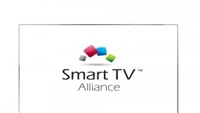Smart TV makers ally to take on cable and satellite operators
The professional video industry's #1 source for news, trends and product and tech information. Sign up below.
You are now subscribed
Your newsletter sign-up was successful

Smart TV makers have decided to bury their competitive hatchet and form an alliance to develop common standards for connected TV, and avoid the format wars that have bogged down previous emerging technologies in the broadcasting sphere.
In doing so, they recognize that they have more to gain than lose by joining forces to take on established pay TV operators with hybrid services. The aim is to stimulate development of innovative apps that combine the strengths of both broadcast TV and the Internet to provide content and viewing options associated with a show being broadcast. The Smart TV alliance is aiming to capitalize on the relatively closed nature of emerging hybrid platforms such as HbbTV, which are largely controlled by broadcasters and have been criticized by app developers for being insufficiently open.
The Smart TV Alliance has been founded by South Korean based LG Electronics, and TP Vision, which was set up by Philips to market and sell its TVs in partnership with Taiwanese-based TPV Technology. All the other major smart TV makers have been invited to join, and early indications are that most will. To do so, smart TV makers such as Samsung, Sony and Panasonic, as well as the two founding Smart TV Alliance members, will have to give up exploiting proprietary technologies to create a closed ecosystem and lock consumers into their products.
Many of the key standards already exist, such as HTML5 for structuring and presenting content over the web. The Smart TV Alliance is building on these to provide a common software development kit (SDK) that can be used to develop apps that will run on any smart TV. This will be the critical component of the Smart TV Alliance platform, conforming to its motto of "build once, run everywhere." The hope is that the SDK will stimulate app development by enabling developers to create single versions of apps that will run on all compliant Smart TVs.
The SDK is already available on the Smart TV Alliance website, which developers can download free of charge and use to build applications. It is based on open web technologies including HTML5, insulating compliant web applications from the underlying TV hardware.
The Smart TV Alliance plans to build on this first version and announce specifications for SDK 2.0, followed by the actual SDK 2.0 software release, at the end of 2012. This will clear the way for developers to create applications for a new generation of TV sets from participating Alliance members in 2013.
“Before today, the Smart TV industry was a very difficult market for both TV manufacturers and application developers as TVs from different brands used different platforms and technologies,” said Bong-seok Kwon of LG Electronics, president of the Smart TV Alliance. “Smart TV Alliance creates a larger playing field which encourages developers to create more and better TV applications, at the same time giving manufacturers and consumers the richest source of movies-on-demand, music services, games, social networking and more.”
Smart TV makers had become aware that, as connected TVs become commonplace, the market could enter another format war if they persisted with their proprietary platforms. This has happened at least twice before, most recently in the battle between HD DVD and Blu-Ray, won by the latter, and earlier in the famous drawn out victory of VHS over Betamax for video formats in the 1970s and 1980s. The TV makers have concluded that nobody gained ultimately from these battles, which merely held back progress.
The professional video industry's #1 source for news, trends and product and tech information. Sign up below.
Aware that consumers were among the losers during these past battles, the Smart TV Alliance has also addressed that sector as well as developers, with the idea that there will be a general app store in future, not confined to one TV platform.
The main question to be resolved is whether all the main manufacturers sign up, which will decide the ultimate fate of the Smart Alliance. The attitude of major parties such as Microsoft, Google and Apple will also be significant.
